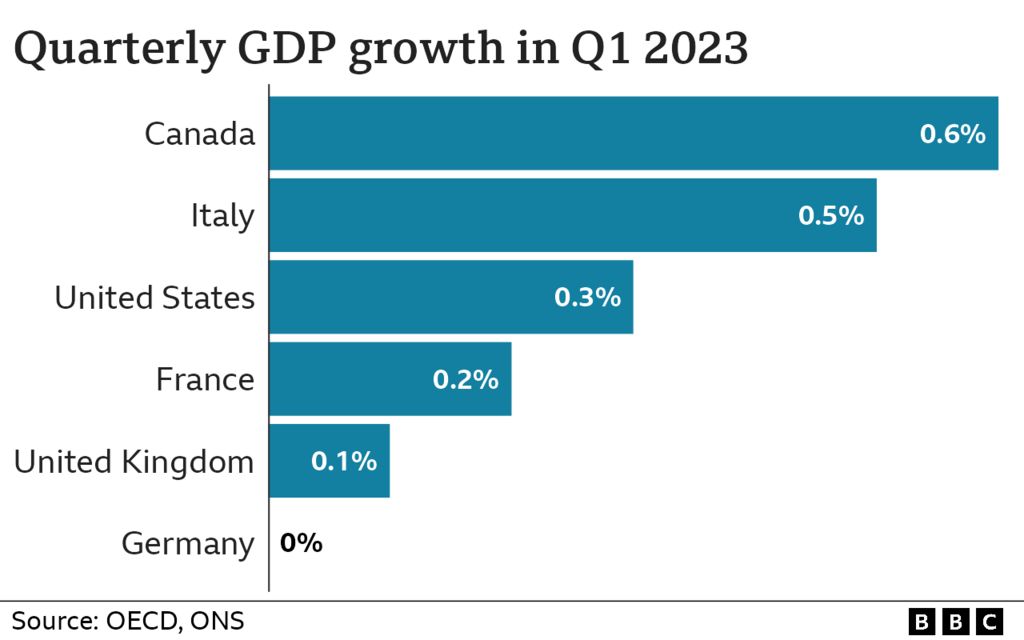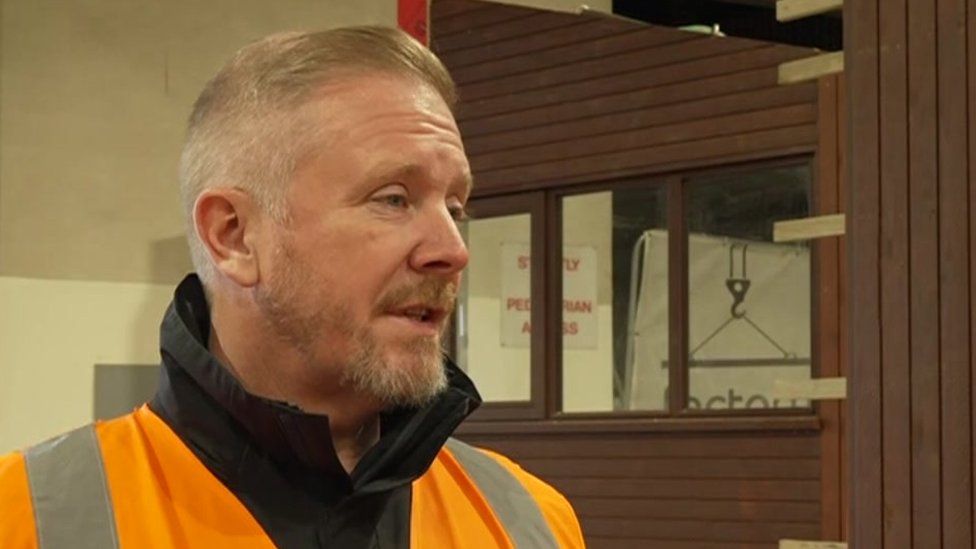The UK grew only weakly in the first three months of the year with the economy hit by strikes, cost of living pressures and wet weather.
The economy grew by just 0.1% between January and March, figures showed, and it remains smaller than levels seen before the Covid pandemic.
The UK is also lagging behind growth seen in other major economies.
On Thursday, the Bank of England said it was more optimistic about prospects, and the UK would avoid a recession.
Its comments came after the Bank increased interest rates to 4.5% from 4.25% as part of its continued attempt to slow soaring prices.
The ONS figures showed that while the economy grew slightly over the first three months of 2023, in March it contracted by 0.3%, with car sales and the retail sector having a bad month.
The economy is still 0.5% smaller than pre-pandemic levels, the ONS said.
While the UK outperformed Germany in the first three months of the year, many other major economies grew faster.

Victoria Scholar, head of investment at Interactive Investor, said: “Stubbornly high inflation, negative real wage growth and general cost of living pressures are weighing on the consumer, and in turn the services industry which is typically a key growth engine for the UK economy.
“Today’s figures point to the importance of taming inflation, a daunting task facing the Bank of England and the government, in order to catalyse a revival in services.”
Darren Morgan, director of economic statistics at the ONS, said while growth during the first quarter of the year had been helped by IT and construction, this had been partially offset by the impact of strikes in the health, education and public administration sectors.
Speaking to the BBC’s Today programme, Mr Morgan also said that car sales had been “relatively weak” for March, while retail sales had been hit by wet weather which put people off visiting the High Street.
“We also saw food store sales slip and retailers told us that the increased cost of living and rising food prices are continuing to affect consumer spending,” he added.


The economy just about grew in the first quarter of this year, but at 0.1% that was by the barest possible margin. The fall in March, the latest month, is of some concern with the service sector going into reverse, and car sales disappointing.
Strikes and the weather are factors here, but there is no denying the sluggish pattern that has persisted for a year now, as energy prices have risen. It will be not much comfort that Germany is not growing at all. On a quarterly basis the UK economy has still not regained all the ground lost since the pandemic and Brexit.
The current second quarter could see a fall too given the extra bank holiday. But forecasters are looking for the second half of the year for growth to start climbing again.
After a massive energy shock and other crises, the avoidance of a recession exceeds expectations. As the Bank of England said yesterday, two thirds of the impact of rate rises to date are yet to hit households.
While the engine of growth in the economy is on, the UK is going to have to wait a little longer for take-off.

Responding to the latest growth figures, Chancellor Jeremy Hunt said: “It’s good news that the economy is growing but to reach the government’s growth priority we need to stay focused on competitive taxes, labour supply and productivity.”
Shadow chancellor Rachel Reeves said: “Despite our country’s huge potential and promise, today is another day in the dismal low growth record book of this Conservative government.”
David Dargan, managing director of construction business Starship Group, told the BBC he was positive about the outlook for the economy.

“We’ve had a bit of a perfect storm in construction with rising costs, shortages of material and labour but I think we’ve been really resilient and have learnt to trade our way through it,” he said.
He added that the construction sector was facing a “new norm” when it comes to costs and it has taken clients a while to get used to that.
KPMG economist Yael Selfin said the contraction seen in the economy during March “underscores its fragility”, despite lower energy prices, improvements to the supply of goods, and a pick-up in consumer confidence.
“While recession is probably no longer on the cards, vulnerabilities resulting from higher borrowing costs… are likely to dampen business and household activity this year.”



